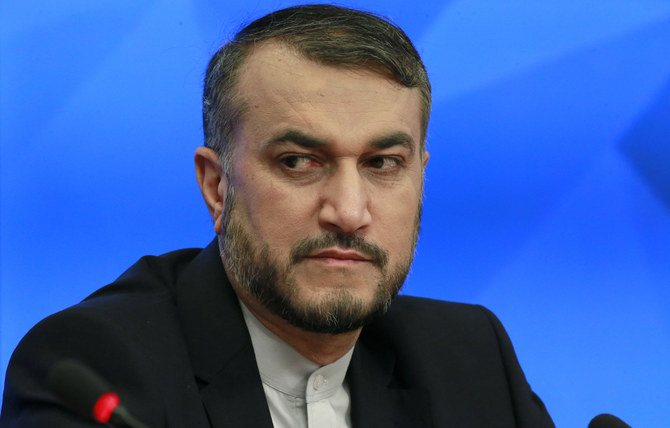
- ARAB NEWS
- 18 Apr 2024

Iranian Foreign Minister Hossein Amir-Abdollahian had a busy maiden visit to the UN, but he did not raise hopes about restarting talks with the P5+1 about reviving the Joint Comprehensive Plan of Action nuclear deal. Instead of giving a specific date to return to the Vienna talks, he invoked a “rights-based approach,” reminiscent of former President Mahmoud Ahmadinejad’s aide Saeed Jalili. Despite being three months into the Iranian transition, much cynicism surrounds the new government’s positions, particularly regarding whether or not it intends to recommence the nuclear talks in 2021.
The Biden administration has softened its language when condemning the belligerent acts of the Houthi militia and Hezbollah. In recent statements, it has avoided naming them explicitly, which is indicative of its softer position toward these terror outfits. It is important to note that this softer approach is viewed by many as a weakness rather than a positive overture. As a result, any Iranian return to the Vienna talks, whether sooner or later, is most likely going to be with less flexibility and more intransigence.
The telltale signs are everywhere. Take the case of the International Atomic Energy Agency’s agreement with Iran. On Sept. 12, IAEA Director General Rafael Grossi stated: “I am glad to say that today we were able to have a very constructive result, which has to do with the continuity of the operation of the agency’s equipment here.” He had termed it indispensable for the IAEA and the world to have “the necessary guarantee and information.” A fortnight later, the UN nuclear watchdog expressed disappointment, stating that “Iran’s decision not to allow the agency access to the TESA Karaj centrifuge component manufacturing workshop is contrary to the agreed terms of the joint statement issued on 12 September.”
Reacting via Twitter, Kazem Gharibabadi, Iran’s envoy to the IAEA, stated: “Any decision taken by Iran on monitoring equipment is only based on political rather than legal considerations and the Agency cannot and should not consider it as one of its entitlements.”
Behrouz Kamalvandi, spokesman for the Atomic Energy Organization of Iran, also chimed in to reject the IAEA’s demand to access the Karaj centrifuge assembly site as “one-sided and biased.” The IAEA safeguards-compliant facility, Natanz, was targeted by a sabotage attack in June that Tehran blamed on Israel. The damage to the roof and subsequent repair work could be seen on satellite imagery. Even Kamalvandi was reportedly hospitalized due to injuries suffered in the incident. The UN nuclear watchdog discovered that one of its surveillance cameras was destroyed, while another was severely damaged. The AEOI admitted to removing all monitoring cameras from the civilian site.
Any Iranian return to the Vienna talks, whether sooner or later, is most likely going to be with less flexibility and more intransigence.
Dr. Mohammed Al-Sulami
Tehran complying with the IAEA’s demand to share the video footage will be akin to it voluntarily providing the details of the damage and its source. It could cause huge embarrassment in Iran if the incident occurred due to an internal failure. However, if it was in fact an act of sabotage, any video footage might help the saboteurs assess the outcome and plan their next act better. Tehran is holding back on sharing all videos while the JCPOA issue remains unresolved.
After the visit of Grossi to Tehran last month, an extract from the IAEA-Iran joint statement specifically read: “IAEA’s inspectors are permitted to service the identified equipment and replace their storage media, which will be kept under the joint IAEA and AEOI seals in Iran. The way and the timing are agreed by the two sides.” However, Gharibabadi interpreted it in a bizarre manner, tweeting: “During the discussions in Tehran & Vienna, Iran indicated that since Tessa Karaj Complex is still under security and judicial investigations, equipment related to this Complex are not included for servicing.”
Mehr News Agency reported last week that Iran claimed to have dismantled a terrorist unit, “supported and guided” by rival spy agencies. This victim narrative nicely complements Iran’s efforts to acquire nuclear technologies and materials beyond the JCPOA-mandated levels. Not only has uranium enrichment been taking place at a faster pace and in larger, more modern centrifuge cascades, but Tehran is also stockpiling or utilizing uranium metal know-how with critical and far-reaching implications.
Though the Raisi government has started on a high note by entering the Shanghai Cooperation Organization as a full member, the policies of the US, France and the UK toward its nuclear activities remain unchanged despite their bitter differences over the Australian submarine deal. Iran, however, may resort to increasingly hawkish posturing, given its tensions with Pakistan, Afghanistan, Azerbaijan and Turkey. Delaying a better JCPOA deal could increase Iran’s power in the region. Therefore, the new Iranian government will continue to remain evasive and coy over when it intends to return to the Vienna talks.
• Dr. Mohammed Al-Sulami is President of the International Institute for Iranian Studies (Rasanah). Twitter: @mohalsulami